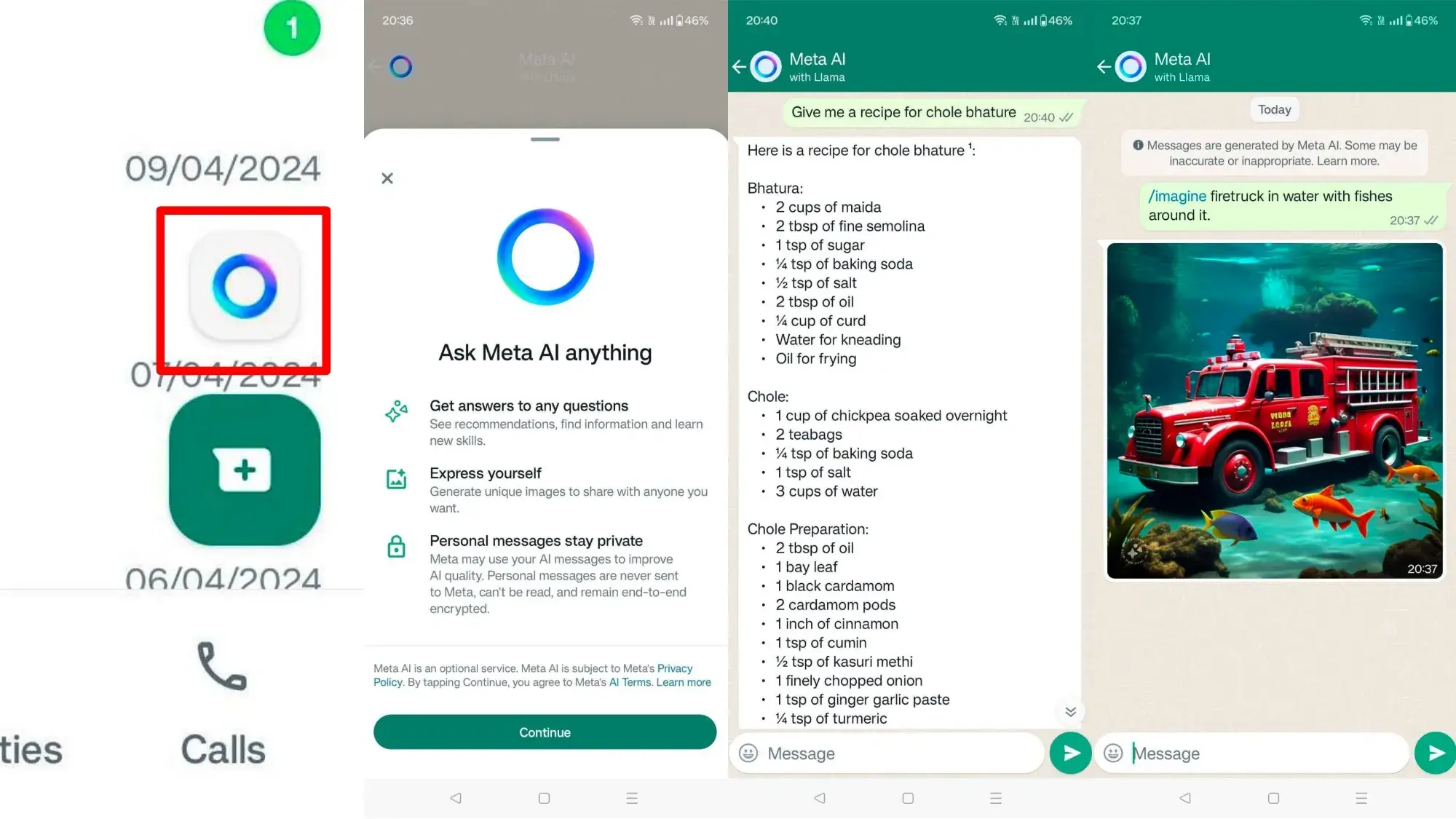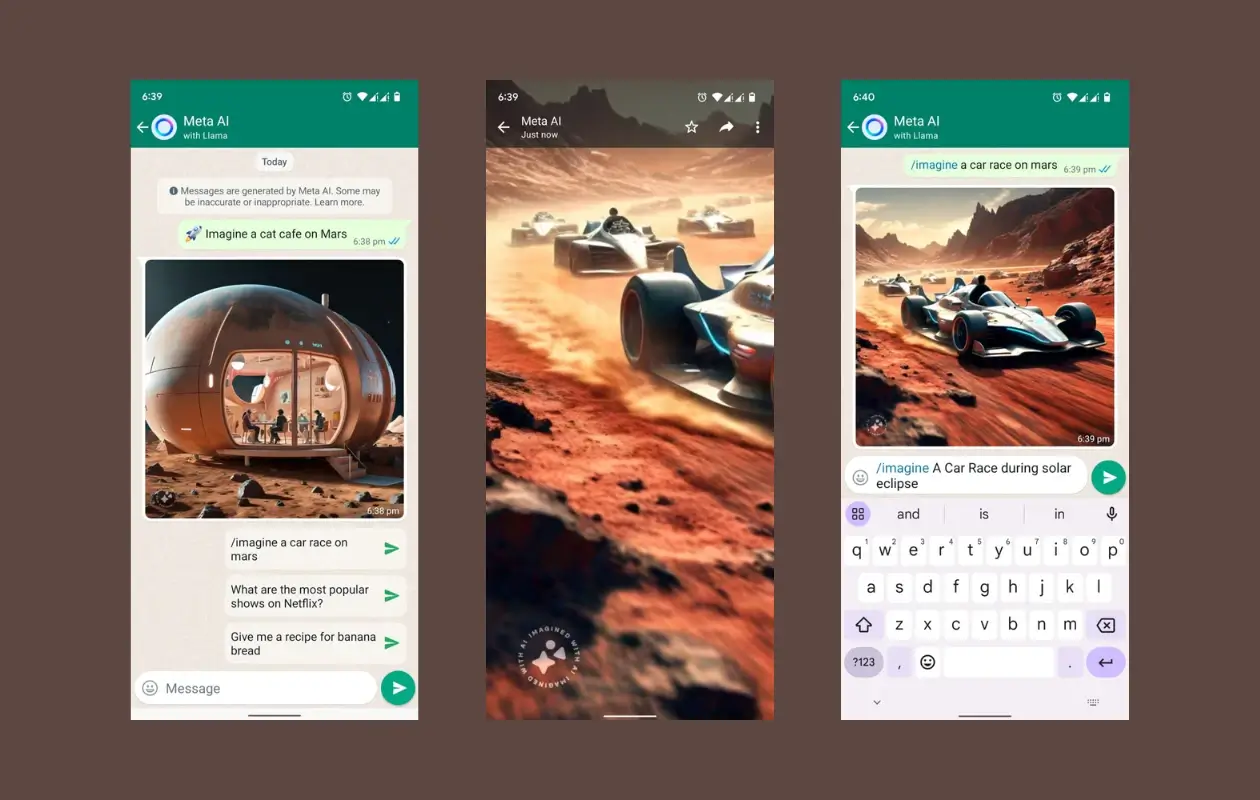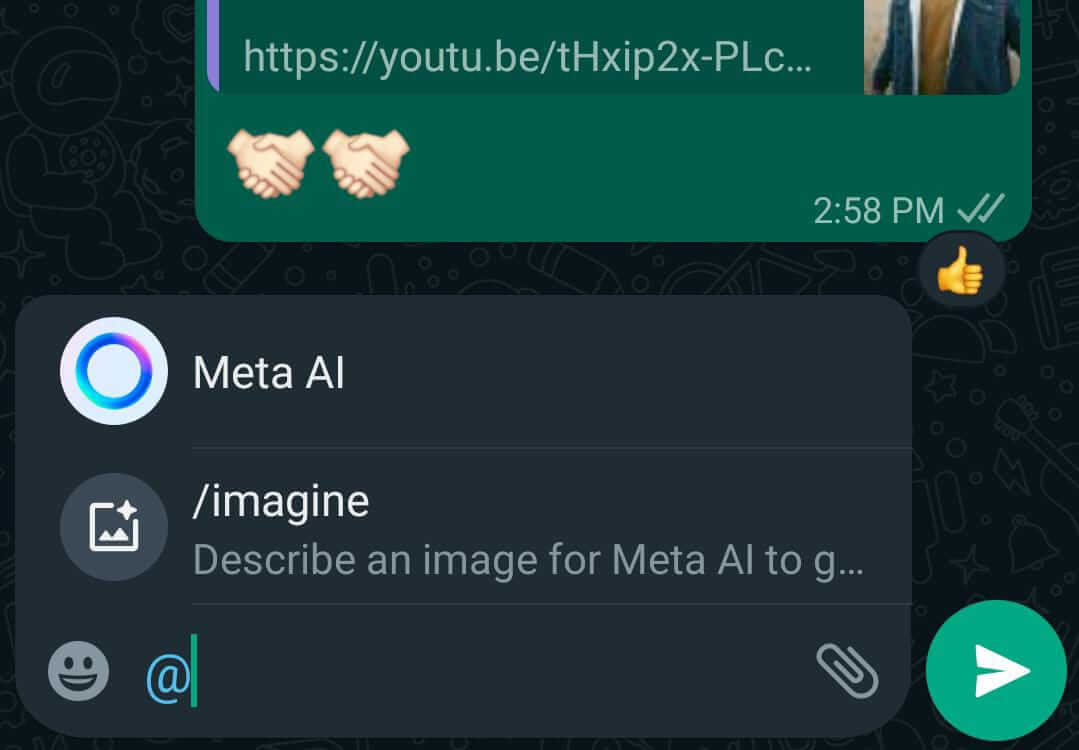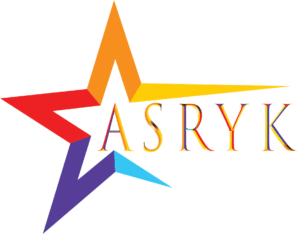Meta AI Chatbot on WhatsApp: Exploration of a New Messaging Frontier
The landscape of communication is constantly evolving. With the rise of messaging apps like WhatsApp, the way we connect with friends, family, and businesses has undergone a dramatic shift. Now, Meta, the company behind WhatsApp, is further blurring the lines between traditional messaging and artificial intelligence (AI) with the introduction of its Meta AI chatbot directly within the WhatsApp platform.
This article delves deep into the world of Meta AI chatbot on WhatsApp, exploring its functionalities, potential benefits, and the broader implications for the future of communication. We’ll examine how this integration changes the way users interact with WhatsApp, analyze its impact on customer service, and discuss the ethical considerations surrounding AI-powered chatbots within a widely used messaging platform.
Breaking Down the Meta AI Chatbot on WhatsApp
Meta’s foray into AI-powered chatbots within WhatsApp represents a significant development. Here’s a breakdown of what the Meta AI chatbot on WhatsApp entails:
- Accessibility: The Meta AI chatbot is currently being rolled out to a limited number of users globally. It’s accessible through a dedicated icon within the Chats tab on the WhatsApp interface.
- Functionality: Users can initiate conversations with the Meta AI chatbot by typing prompts and questions. The AI responds using natural language processing (NLP) to understand the user’s intent and deliver relevant information or complete tasks.
- Capabilities: The current capabilities of the Meta AI chatbot are still under development. However, reports suggest it can perform various functions, including:
- Answering questions about WhatsApp features and functionalities.
- Assisting with basic customer service tasks for businesses with a WhatsApp presence.
- Providing summaries of news articles or factual topics based on user queries.
- Offering suggestions and recommendations based on user preferences and past interactions (limited rollout as of now).
A Glimpse into the Benefits: How Meta AI Chatbot Enhances WhatsApp
The integration of the Meta AI chatbot on WhatsApp holds the potential to enhance the user experience in several ways:
- Improved Customer Service: Businesses can leverage the Meta AI chatbot to provide 24/7 customer support, answer frequently asked questions, and streamline basic customer interactions. This frees up human representatives to handle more complex issues and personalized inquiries.
- Increased Efficiency: Users can access information and complete tasks within the familiar WhatsApp interface without needing to download additional apps or visit external websites. This can save time and effort, leading to a more streamlined user experience.
- Enhanced Accessibility: For users with disabilities or language barriers, the Meta AI chatbot can offer a more accessible way to interact with WhatsApp. Text-based communication can be easier for some users than voice calls or navigating menus.
- Personalized Communication (Future Potential): As the technology matures, the Meta AI chatbot could personalize interactions by learning user preferences and suggesting relevant information or services. This could potentially revolutionize the way users discover and interact with content within WhatsApp.
Beyond Convenience: Exploring the Broader Impact
While the Meta AI chatbot on WhatsApp offers potential benefits, it also raises critical questions that need to be addressed:
- The Future of Human Customer Service: While AI chatbots can handle basic tasks, complex issues may still require a human touch. The integration of AI shouldn’t come at the expense of human interaction in customer service.
- Data Privacy Concerns: The use of AI chatbots necessitates the collection and analysis of user data. Meta needs to ensure robust data privacy practices to protect user information and maintain transparency about how data is collected and used.
- The Potential for Bias: AI algorithms can perpetuate existing biases if not carefully designed and trained. Meta needs to address potential biases within the chatbot to ensure fair and inclusive interactions for all users.
- The Evolving Role of WhatsApp: The introduction of the Meta AI chatbot marks a significant shift for WhatsApp, traditionally known for its focus on private messaging. The balance between AI-powered functionalities and user privacy needs careful consideration.

The Road Ahead: The Future of Meta AI Chatbot on WhatsApp
The Meta AI chatbot on WhatsApp represents a glimpse into the future of communication within messaging platforms. As the technology continues to evolve, we can expect to see advancements in areas like:
- Natural Language Processing (NLP): Enhanced NLP capabilities will allow the chatbot to understand more complex user queries and respond with increased accuracy and nuance.
- Personalization: The chatbot could learn user preferences and tailor responses to individual needs, offering a more personalized messaging experience.
- Multilingual Support: Expanding language support will enable the chatbot to cater to a broader global audience and break down language barriers within communication.
Conclusion: A Catalyst for Change?
The introduction of the Meta AI chatbot on WhatsApp marks a pivotal moment for the messaging platform. While its current functionalities are limited, it holds the potential to significantly change how users interact
with WhatsApp. This article has explored the various facets of the Meta AI chatbot, examining its potential benefits, ethical considerations, and the broader implications for the future of communication.
A Collaborative Future?
The success of the Meta AI chatbot on WhatsApp will hinge on its ability to strike a balance between convenience and user control. Here are some key factors that will likely determine its long-term impact:
- User Adoption: Ultimately, user acceptance will dictate the success of the Meta AI chatbot. Meta needs to ensure the chatbot provides a valuable and seamless experience to encourage user adoption.
- Transparency and User Control: Providing users with clear information about how the chatbot works, what data it collects, and how that data is used is paramount. Users should have control over their interactions with the chatbot and the ability to opt-out if desired.
- Collaboration Between Humans and AI: The ideal scenario involves a collaborative approach where AI chatbots handle routine tasks, freeing up human representatives to provide personalized assistance and build stronger relationships with customers.
A New Era of Messaging?
The Meta AI chatbot represents a significant step towards integrating AI functionalities within a widely used messaging platform. As the technology develops, we can expect to see similar advancements in other messaging apps, potentially ushering in a new era of AI-powered communication. Here’s a glimpse into what this future might hold:
- Contextual Awareness: AI chatbots could become more contextually aware, understanding the emotional tone of conversations and responding accordingly. This would allow for more natural and engaging interactions.
- Proactive Assistance: AI chatbots could anticipate user needs and proactively offer assistance, streamlining tasks and enhancing user experience.
- Integration with Other Services: The chatbot could connect with other services like calendars, travel bookings, or shopping platforms, allowing users to complete tasks directly within the messaging interface.
A Call for Responsible Development
The potential benefits of AI chatbots within messaging platforms are vast. However, it’s crucial to approach this development responsibly. Here are some key considerations:
- Ethical Considerations: Developers need to prioritize ethical considerations throughout the design and development process. Addressing potential biases, ensuring data privacy, and maintaining user control are critical aspects of responsible AI development.
- Human-Centered Design: The focus should remain on creating a user-centric experience that prioritizes human interaction and empowers users. AI should complement, not replace, human communication.
- Transparency and Regulation: Clear guidelines and regulations are needed to ensure transparency in data collection practices and protect user privacy. Governments and tech companies need to work together to establish these frameworks.
The Final Word
The Meta AI chatbot on WhatsApp signifies a turning point in the evolution of messaging platforms. Whether this marks the dawn of a new era of AI-powered communication or simply a passing trend remains to be seen. The path forward hinges on responsible development practices, user-centric design, and a clear focus on ethical considerations. By prioritizing these aspects, Meta and other tech companies can ensure that AI chatbots within messaging platforms enhance the user experience and contribute to a more positive and inclusive communication landscape.



